English Edition

- By CNI
- Category: English Section
- Hits: 99
CNI News
31 January 2026
Because of its election victory, the Shan-Ni party now has the right and responsibility to carry forward the interests of the Shan-Ni regions and the Shanni people, according to Sai Htay Aung, Chairperson of the Tai-Leng (Shanni) Nationalities Development Party (TNDP), who told CNI News.
Myanmar’s multi-party democratic general election was held in three phases beginning on December 28, 2025, and was successfully completed on January 25, 2026.
In the completed election, the TNDP—also known as the Red Tiger Party—contested in Kachin State and won a total of four seats: one seat in the Ethnic Affairs of Parliament, one seat in the Amyotha Hluttaw under the proportional representation (PR) system, and two seats in the State Hluttaw.
At present, the party has become one that can voice public interests inside parliament. Sai Htay Aung said that the party would not only work for the interests of the Shanni people but would also devote strong efforts to serving regional development, he told CNI News.

Tai-Leng (Shanni) Nationalities Development Party (TNDP) campaigning
He stated:
“I would say that our party has now become one that can speak inside parliament on behalf of the people. When we gained the opportunity to speak on these matters, Shanni people were extremely happy.
The reason is that throughout different eras, we had never won before in Kachin State, despite contesting three elections. This time, our representatives have won.
Because our party was established not only to serve Shanni ethnic interests but also to work for regional interests, we will now be able to strongly advocate for regional development inside parliament.
We have already discussed and decided, even before the election, that we will work in a balanced manner both inside and outside parliament. That is why Shanni people are happy to finally have representatives from our party. They place their trust in us.
We will strive to become representatives worthy of the trust and expectations that the public has placed in us.”

TNDP Chairperson Sai Htay Aung
The Red Tiger Party received official registration on May 10, 2013, during the civilian government era, and has continued to exist as a Kachin State–based political party up to the present.
Sai Htay Aung said that because civilians have suffered significant losses amid ongoing armed conflicts, peace would be his party’s top priority. He added that if peace is achieved in Kachin State, more than half of Myanmar could potentially attain peace.
He explained:
“Kachin State has always been part of our party’s agenda. If peace is achieved in Kachin State, more than half of Myanmar could become peaceful.
In reality, our party’s presence in parliament is still limited, with only two MPs. However, the Kachin State People’s Party (KSPP) has also won seats in both the Amyotha Hluttaw and the Pyithu Hluttaw.
If Kachin parties and our party can increase their presence in parliament and engage in broader discussions, we believe that many of the current armed conflict issues can be resolved.
In the past, Kachin State relied heavily on rail transport, but the railway has been unusable for a long time. If train services resume, commodity prices will fall. We want to raise these issues in parliament and work to improve transportation infrastructure.
For the railway to operate again, peace is essential. That is why peace is already included as our number-one priority in the party’s agenda. We will work with full dedication to achieve peace.
As a party, we will strive to ensure that the voices of the people can be heard inside parliament.
There are also many corrupt or irresponsible officials operating within the democratic system amid armed conflicts. Because of these officials, public resentment toward the state continues to grow. When such situations arise, we will speak out without hesitation.
As a region-based party, we will work to ensure that individuals who exploit the region for personal gain, without benefiting the local population, are held accountable under the law.”
In Kachin State, clashes continue between the Myanmar military (Tatmadaw) and KIA-PDF forces. In neighboring Sagaing Region, which borders Kachin State, KIA-PDF forces have also been conducting town-seizure operations.
During the election period, KIA-PDF forces also carried out disruptions and attacks aimed at obstructing the election process.
In Myanmar’s recently completed election, a total of 57 political parties—six union-level parties and 51 regional or state-level parties—along with 4,863 independent candidates, contested the election.
It has been announced that parliament will be convened in March and a new government will be formed in April. Senior General Min Aung Hlaing stated that state power would be transferred to the party that won the election.

- By CNI
- Category: English Section
- Hits: 166
CNI News
31 January 2026
Following the results of Myanmar’s 2025 General Election, a political landscape has emerged in which a single political party dominates both parliament (Hluttaw) and the government. As a result, the role of media outside the parliament has become increasingly important, according to U Ko Ko Gyi, Chairperson of the People’s Party (PP), who told CNI News.
He said that in the coming period, mutual checks and balances within parliament may weaken, making the role of media outside the Hluttaw more crucial. He also noted that the emergence of a national unity government would depend on the winning party’s reasoning and political judgment.
U Ko Ko Gyi stated:
“Now that one party has won a majority, the priorities of the winning party will naturally become government policy. Our country’s political system is based on a single parliamentary election. So when one party wins a majority in parliament, the government will also be led by that winning party.
We had already pointed this out beforehand. As a result, the system of mutual oversight and checks is affected. At such a time, what becomes important is the role of the media outside parliament. The key question is how freely the media will be allowed to speak openly.
Another important point is that political parties which did not win should still monitor, criticize, point out issues, and offer advice regarding parliamentary activities and government actions.
As for a National Unity Government, it fundamentally depends on the thinking and judgment of the winning party, because legal authority has now passed into the hands of that party. Therefore, while we can offer suggestions, the final decisions will ultimately be made by the winning party.”
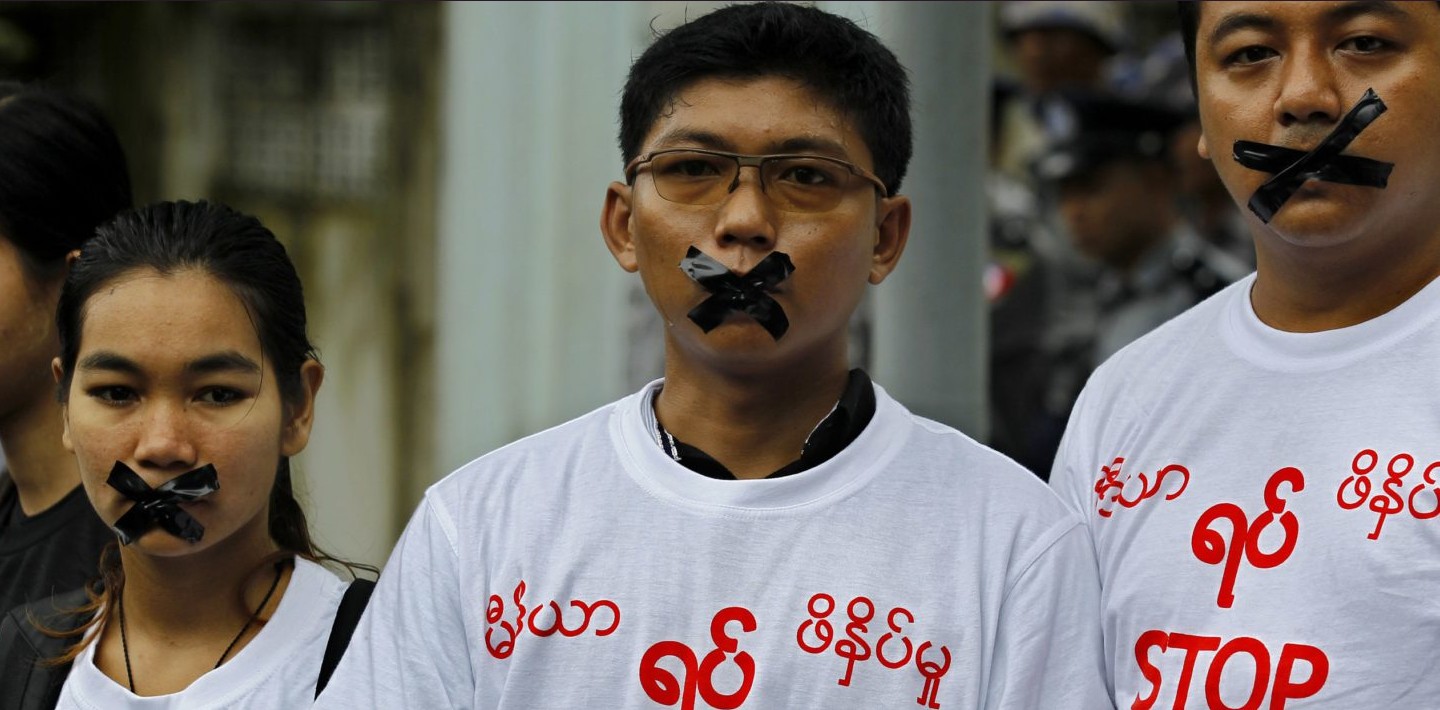
Journalists protesting during U Thein Sein’s administration (AFP)
Political parties and political observers have also pointed out that the post-election government needs to be flexible yet firm, and must work seriously and decisively toward achieving sustainable, long-term peace.
Sai Mein, Editor-in-Chief of Shan Herald News Agency, said that during former President U Thein Sein’s administration, both domestic and foreign journalists were welcomed and media freedom was granted, allowing a reasonable level of mutual oversight.
He explained:
“During U Thein Sein’s era after 2010, trust-building was prioritized—not only politically, but also with the media. The government issued announcements welcoming people living abroad, including journalists, which encouraged them to return.
Today, what matters is not just the idea of ‘change,’ but the reality of how freely journalists are allowed to travel and operate. How transparent will things be? How much freedom will be granted in ethnic border areas? That is the true measure of a genuine welcome.
Only then can the media move freely; and only when the media can move freely can they report freely. Only through free reporting can we assess how much the new government truly represents the people and serves public interests.
Most importantly, laws such as Section 66(d), laws related to alleged treason, electronic communications laws, and Section 17(1) must all be repealed. Only then will the media regard this government as one that truly practices openness and transparency. That is the key issue.”
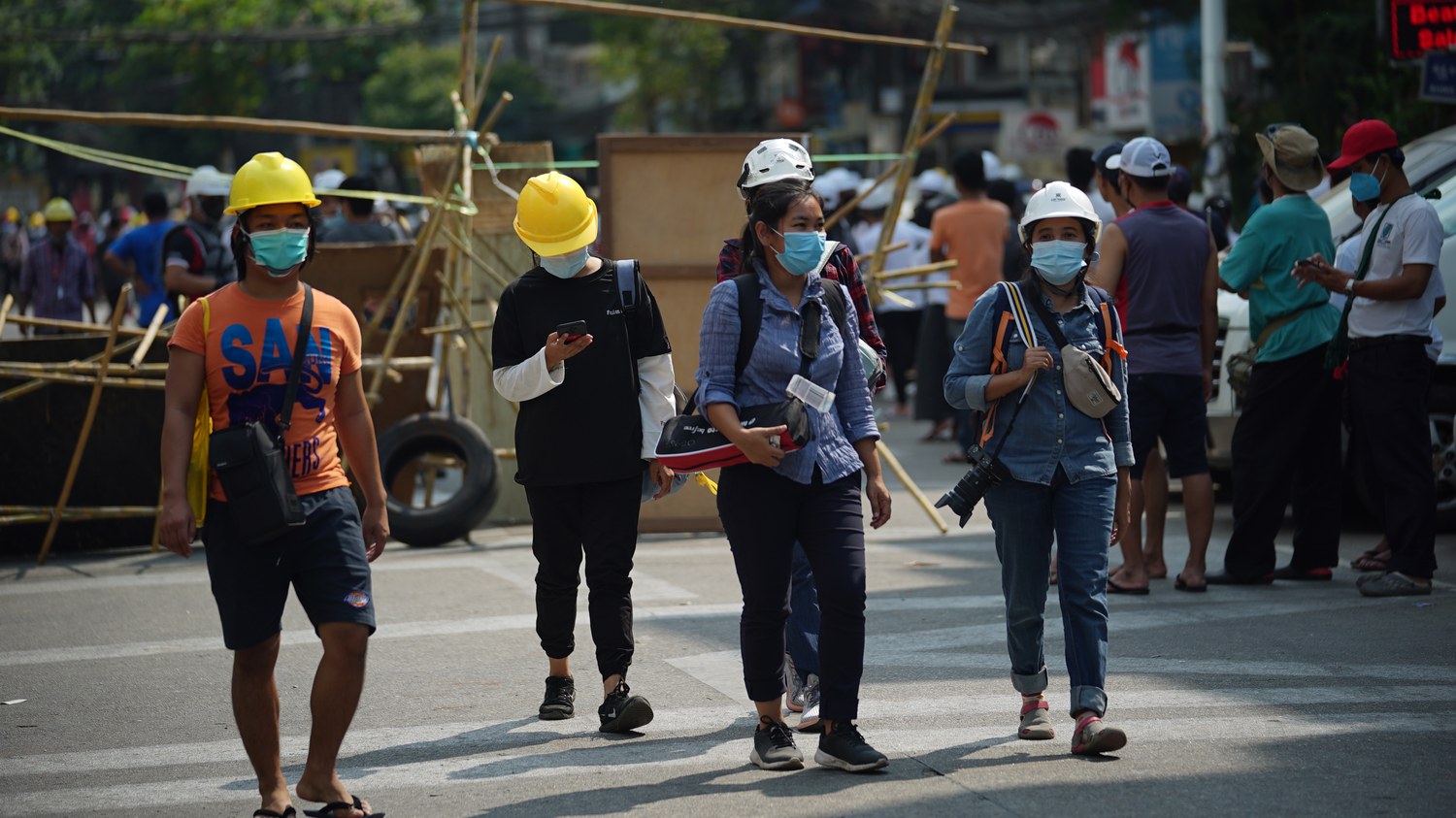
Journalists gathering news (Credit: Original owner)
During the administration of U Thein Sein, which came to power after the 2010 General Election, media freedom was expanded, and foreign media organizations were allowed to establish offices inside Myanmar. Journalists were able to freely express opinions about the government, and mutual oversight between the media and the government, as well as between the media and parliament, was possible.
However, during the administration of Daw Aung San Suu Kyi, which came to power after the 2015 General Election, media freedoms were restricted. Many journalists were arrested and prosecuted under laws such as Section 66(d) and Section 17(1).

- By CNI
- Category: English Section
- Hits: 127
CNI News
30 January 2026
The 7 EAO Alliance, composed of seven ethnic armed organizations that are signatories to the Nationwide Ceasefire Agreement (NCA), held a meeting on January 28, 2026.
According to a statement released on January 28, the meeting involved analyzing and discussing current political and military developments, the international landscape, and potential scenarios that may arise in the post-election period.
The 7 EAO Alliance further announced that the meeting successfully established several key directives, including:
Guidelines for the transition toward a Federal Democratic Union.
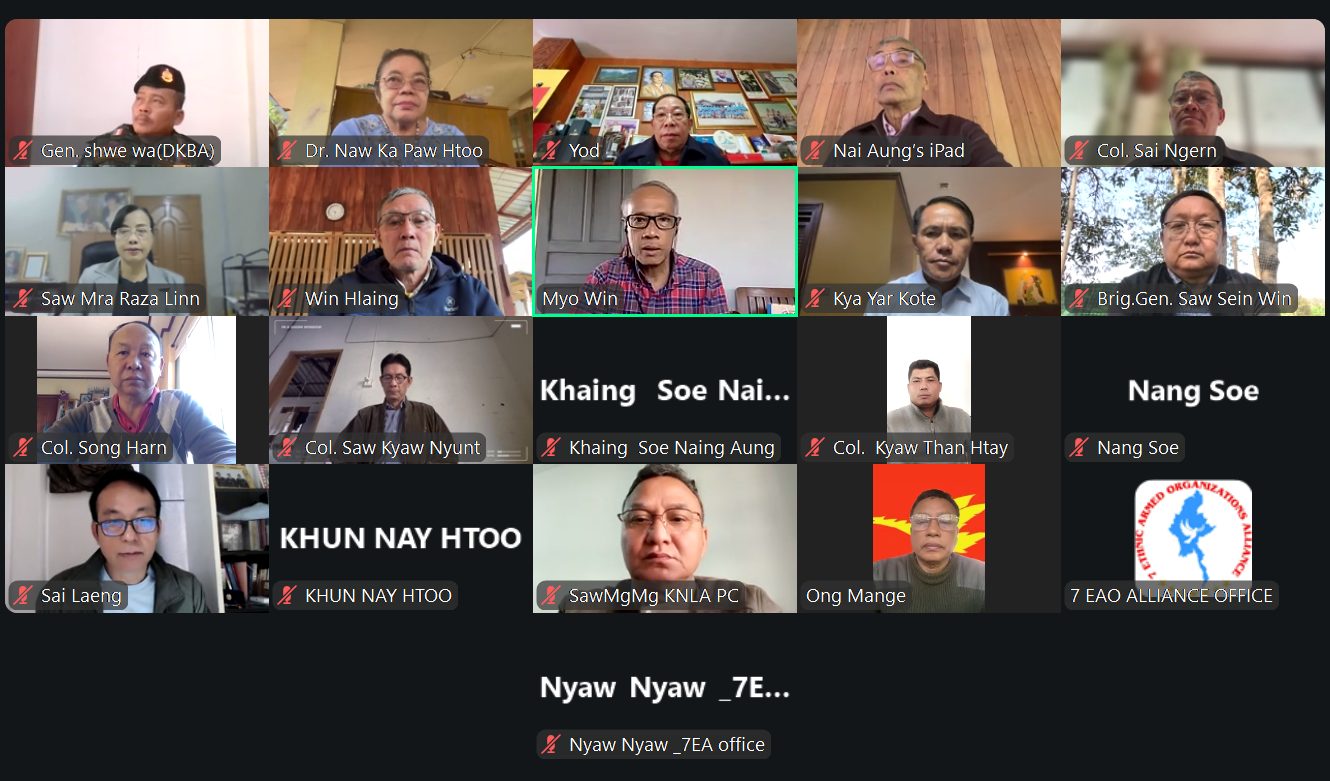
Guidelines for the 7 EAO’s strategic review and preparatory measures.
Guidelines for the review of the ongoing peace process.
The 7 EAO Alliance consists of the following members: Restoration Council of Shan State (RCSS), New Mon State Party (NMSP), Democratic Karen Benevolent Army (DKBA), KNU/KNLA Peace Council (KNU/KNLA-PC), Pa-O National Liberation Organization (PNLO), Arakan Liberation Party (ALP), Lahu Democratic Union (LDU).

- By CNI
- Category: English Section
- Hits: 124
CNI News
30 January 2026
Political parties and observers are analyzing whether the Union Solidarity and Development Party (USDP), which won the election, might form a national unity government style administration in the post-election period.
Dr. Aye Maung, Chairman of the Arakan Front Party (AFP), told CNI News that a review of the USDP’s goals, policies, slogans, and their conduct during the election period suggests they may not form a government alone. Instead, they are likely to collaborate with individuals capable of shaping the nation’s future to form a national unity government.
"Looking back at the entire election period, their slogan was to build a 'Stronger Myanmar.' The founders and current leaders of the USDP have a vision to build a more robust state. One should analyze whether they intend to go it alone or not. The post-election government needs to align with the USDP’s slogan. Given the 'Stronger Myanmar' motto, it doesn’t seem like the USDP will form a government in isolation. They are moving towards a model of working together with qualified individuals, current leaders, and visionaries for the future state. Although the USDP could form a government on its own, they already have a vision for the future of the new state. This makes it more likely they will form such a government, reducing the likelihood of a single-party administration. Therefore, a government capable of leading national unity and national reconciliation is likely to emerge," he said.
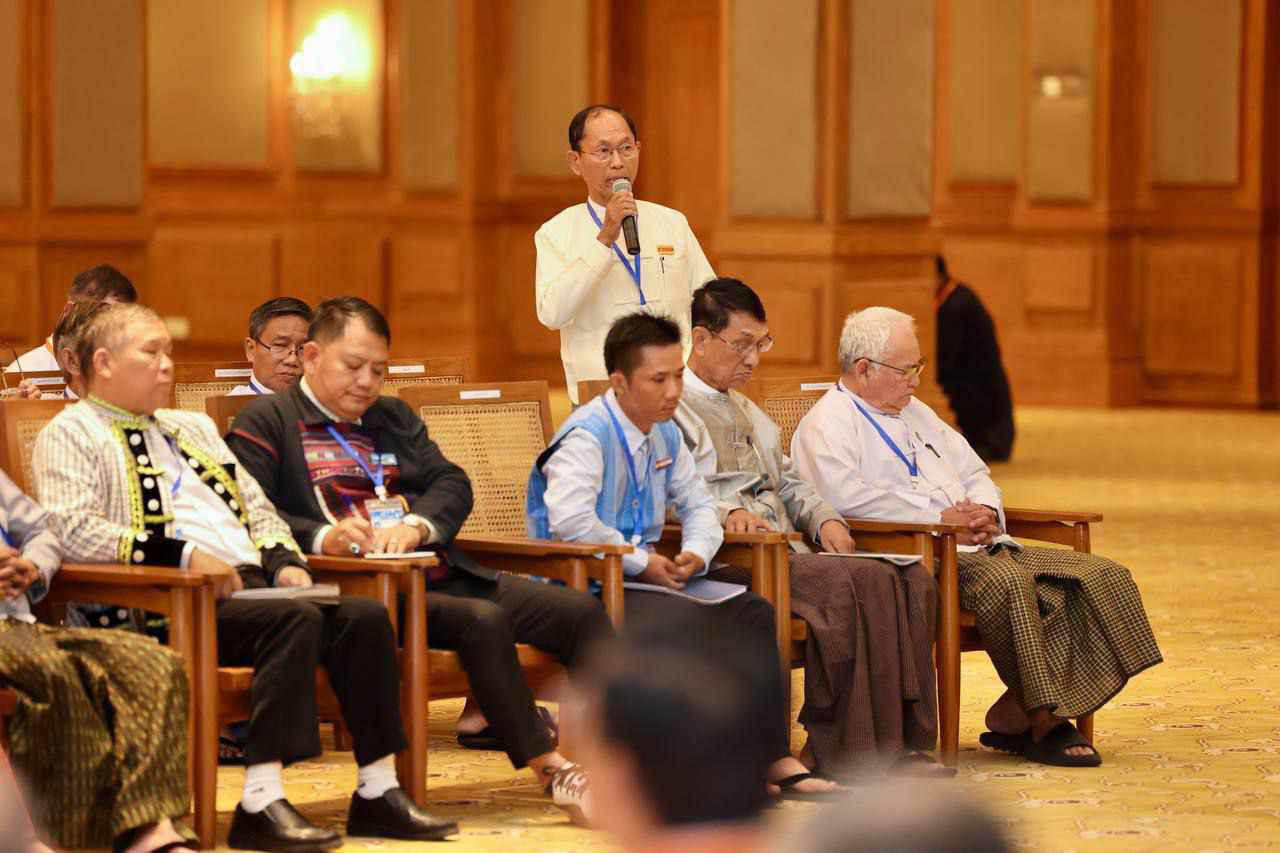
U Ko Ko Gyi and other political party members.
U Ko Ko Gyi, Chairman of the People’s Party (PP), stated on January 25, 2026, during the third phase of the election, that the incoming government needs to form a national unity government to resolve the current armed conflicts and political crises.
"I have been calling for the formation of a national unity government since before 2020—long before the current overseas NUG was even a concept. I said then that because this country is rife with conflict, we should avoid a 'winner-takes-all' approach and instead create a government structure capable of resolving those conflicts. This is different from a coalition. At the time, I faced much criticism from people who didn't want a coalition. A coalition is when a single party cannot form a government and has to join with smaller parties. A National Unity Government is one where, even if a party can govern alone, it includes ethnic leaders and other democratic forces that ought to be included. I said this over six years ago, and the need remains today. I'm not saying this based on who won more or fewer seats. In times of such high conflict, the magnanimity, intellect, and heart of the leaders are vital. If we instead provoke emotions and stay at extreme ends, our country will never recover. That’s why I want to emphasize again the need for a National Unity Government format," he said.
Political analyst U Htet Aung Kyaw told CNI News that since the winning USDP can choose how to shape the government, it ultimately depends on them. He added that the emergence of an elected government meets at least the minimum expectations.
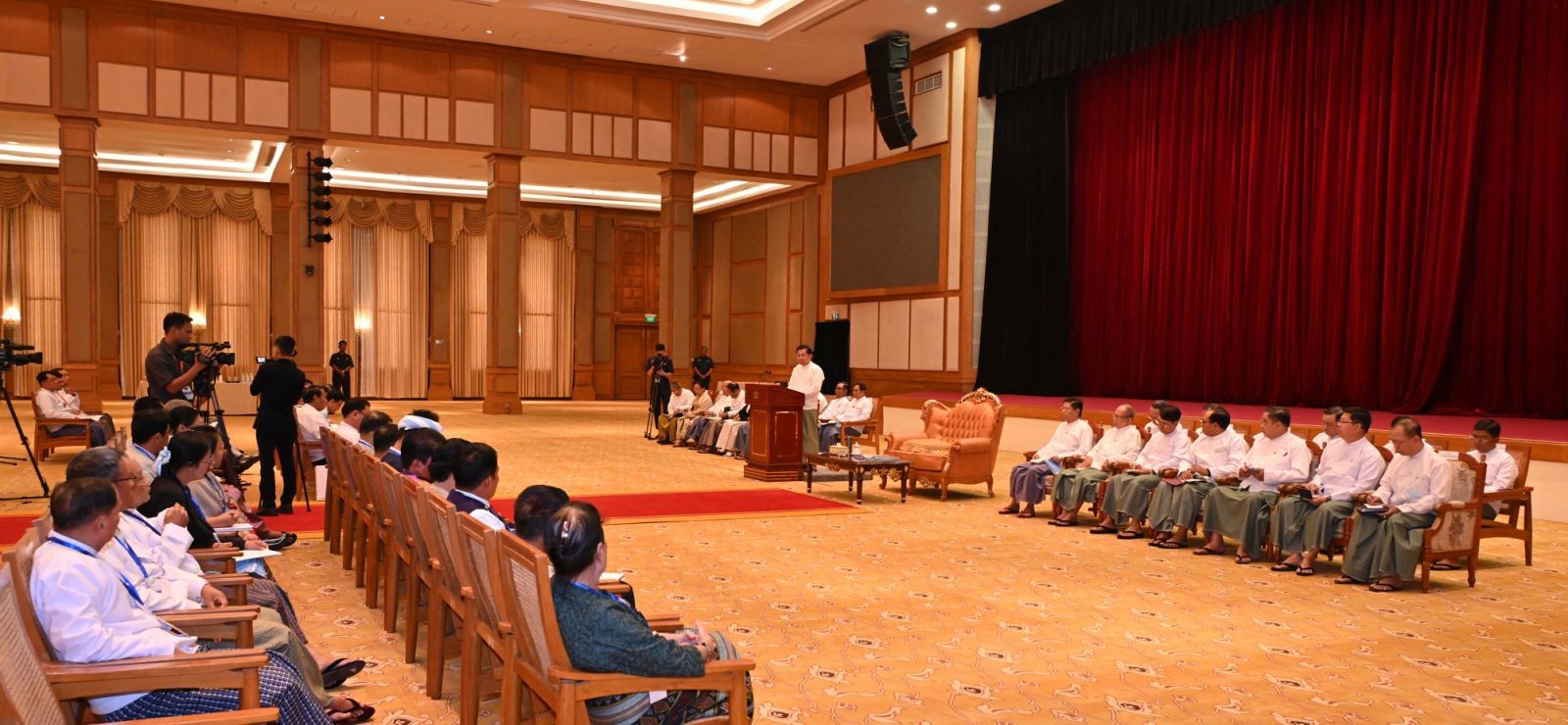
Senior General Min Aung Hlaing meeting with political parties.
"It will likely be a government led primarily by the USDP and the military. The National Unity Government U Ko Ko Gyi mentioned will happen if they want it to, and won't if they don't. It depends on how the winning party thinks. There isn't much more to say; they have the freedom to create it as they see fit. Whatever happens, our minimum expectation—the return of Parliament and the emergence of an elected government—has been met. We will all have to work together to see how much 'check and balance' can be achieved within the current framework," he said.
Myanmar’s multi-party general election was held in three phases starting December 28, 2025, and was successfully concluded on January 25, 2026.
A total of 57 political parties (6 Union-level and 51 Regional/State parties) and 4,863 independent candidates participated. Senior General Min Aung Hlaing has stated that Parliament will convene in March, the new government will form in April, and state power will be transferred to the winning party.
To form a government in Myanmar, a party needs 50% of the 588 seats in the Union Parliament (294 seats). Before the final results of the January 25 phase were known, the USDP had already secured 194 seats from the first two phases. When combined with the 166 seats (25%) reserved for military appointees, the USDP-aligned bloc currently holds 360 seats, surpassing the 294 seats required to form a government.

- By CNI
- Category: English Section
- Hits: 99
CNI News
30 January 2026
Political observers and political parties are pointing out that Election Commissions, which are a vital pillar of Myanmar’s electoral process, should be selected and appointed by the Parliament (Hluttaw).
Political parties emphasize that it is crucial for the Election Commission to be an independent body composed of independent individuals. They argue that only through such independence can the commission resolve disputes impartially and conduct free and fair elections.
U Saw Than Myint, Joint Secretary of the Shan and Nationalities Democratic Party (SNDP), told CNI News that there are 43 points some of which are related to the Election Commission that have been negotiated and agreed upon between the NSPNC (National Solidarity and Peacemaking Negotiation Committee) and the political party groups.
"The NSPNC and the political party groups have reached an agreement regarding the Commission. We assume this will be approved in the upcoming Parliament. These are facts already discussed within the NSPNC. For example, the political party groups and the Tatmadaw's NSPNC have already agreed upon those 43 points in principle. If these are approved in the upcoming Parliament, the format for appointing the Election Commission will change. Those 43 points will be reviewed and approved in accordance with parliamentary bylaws. Whether it actually happens depends a lot on the upcoming Parliament, but I think it will. Even now, the agreement includes the USDP (Union Solidarity and Development Party) within the political party group, as well as ourselves. Since the USDP is among the top winners and they are involved, and the Tatmadaw also supports and agrees with it, I believe these 43 points will be re-negotiated and approved by the MPs in accordance with the law and bylaws," he said.
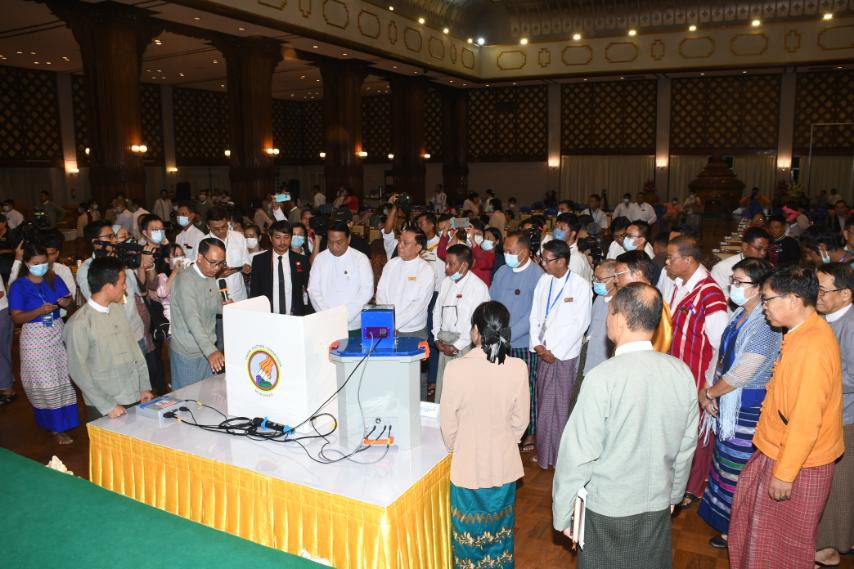
A meeting between the Election Commission and political parties.
In Myanmar, the 2025 General Election was successfully held in three phases from December 28, 2025, to January 25, 2026. Following this, Senior General Min Aung Hlaing has stated that the Parliament will be convened in March, and a new government will be formed in April.
However, political analyst Dr. Aung Myo told CNI News that the Election Commission should not even be chosen by the Parliament, but rather should be directly elected by the people.
"The Parliament shouldn't choose the Election Commission either. If the Parliament chooses, there is a risk it will just be whoever the ruling party selects by majority vote. Ideally, the Parliament shouldn't have the right to choose them; the Parliament should stick to law-making. The best way is for the public to elect the Election Commission directly. During the general election, township commission chairmen should be elected at the same time. This would result in over 300 chairmen nationwide. Then, those chairmen should hold a convention to elect the Union Election Commission and the Regional Commissions. Some township chairmen would move up to the regional or central levels. Members must be part of this commission structure only—they must never have been a member of any political party or political organization," he said.
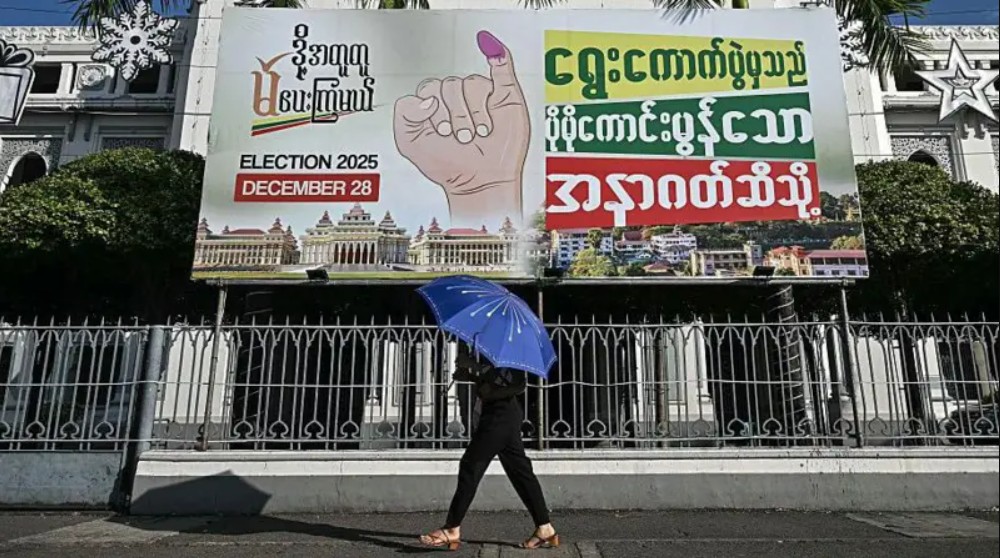
An election awareness notice.
In the recently concluded 2025 General Election in Myanmar, a total of 57 political parties (6 Union-level parties and 51 parties competing within a single Region or State) and 4,863 independent candidates participated.
However, political parties have raised criticisms regarding the election, particularly concerning advance voting issues and the compilation and announcement of voter lists.

- By CNI
- Category: English Section
- Hits: 99
CNI News
January 30, 2026
U Mahn Aung Pyi Soe, Chairman of the Karen National Democratic Party (KNDP), told CNI News that in addition to Ward and Village Tract Administrators, Township and District Administrators should also be appointed through an elective system.
He stated, "According to the Constitution, administrators are not elected at the District level; they are elected at the State level. Then, they are elected at the Ward and Village level. They are not elected at the Township and District levels. We are not satisfied with that. People are talking about it. It would be best if every administrator—at the District level, Township level, and the grassroots level—was chosen through an elective system."
He continued, "The Constitution does not explicitly state that these roles must be handled through elections. I wonder if they think electing Township and District Administrators would be too much trouble. If possible, an elective system would be the best. That is how I see it."
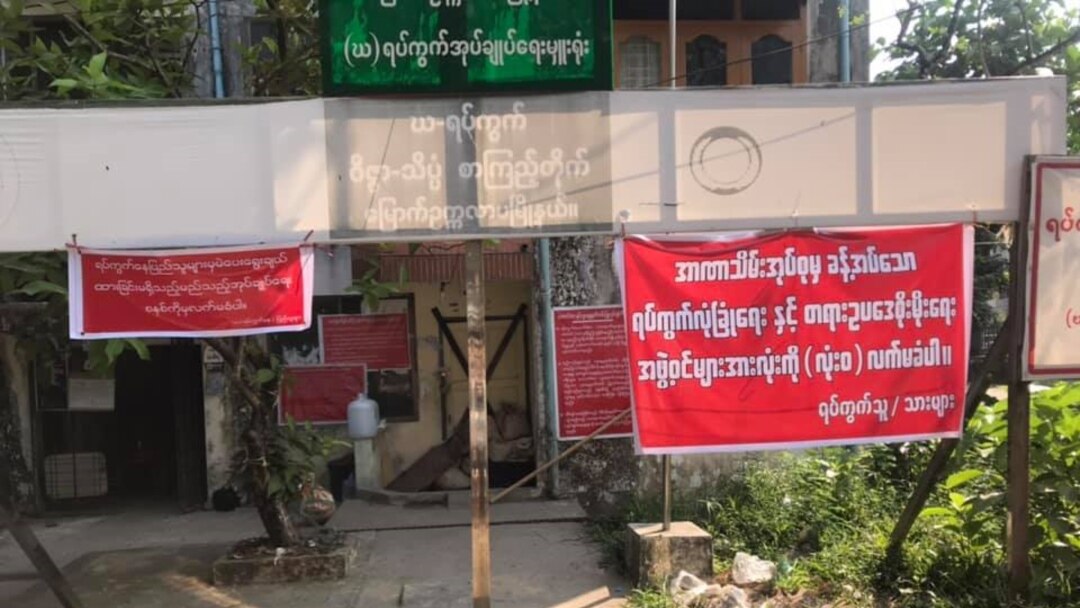
A Ward Administrator’s office.
Section 10 of the Ward or Village Tract Administration Law stipulates that anyone elected as a Ward or Village Tract Administrator must not participate in party political activities during their term of office, starting from the day of their appointment.
Based on the experience of the 2025 Multi-party Democratic General Election, U Ko Ko Gyi, Chairman of the People’s Party (PP), told media on January 25 during a session on "Election Part (3)" that Ward Administrators are the most fundamental element of Myanmar’s administration. He emphasized the need to review and reform the system to ensure Ward Administrators are independent of political parties and remain impartial.
He said, "The role of Ward Administrators was very prominent in this election. They are crucial in compiling voter lists and handling advance votes. We learned from this election experience that we need to reform the system so that Ward Administrators are free from political party influence and act neutrally. Because Ward Administrators were being threatened or killed, there was a shortage of people willing to do the job. Among those who stepped in, some acted fairly, while others significantly impacted the election results. Therefore, I want to say that the Ward Administrator system needs to be seriously reviewed and reformed."
U Li Paw Reh, Chairman of the Lisu National Development Party (Dulei Party), told CNI News that future governments must ensure that administrative bodies provide precise instructions to these administrators.
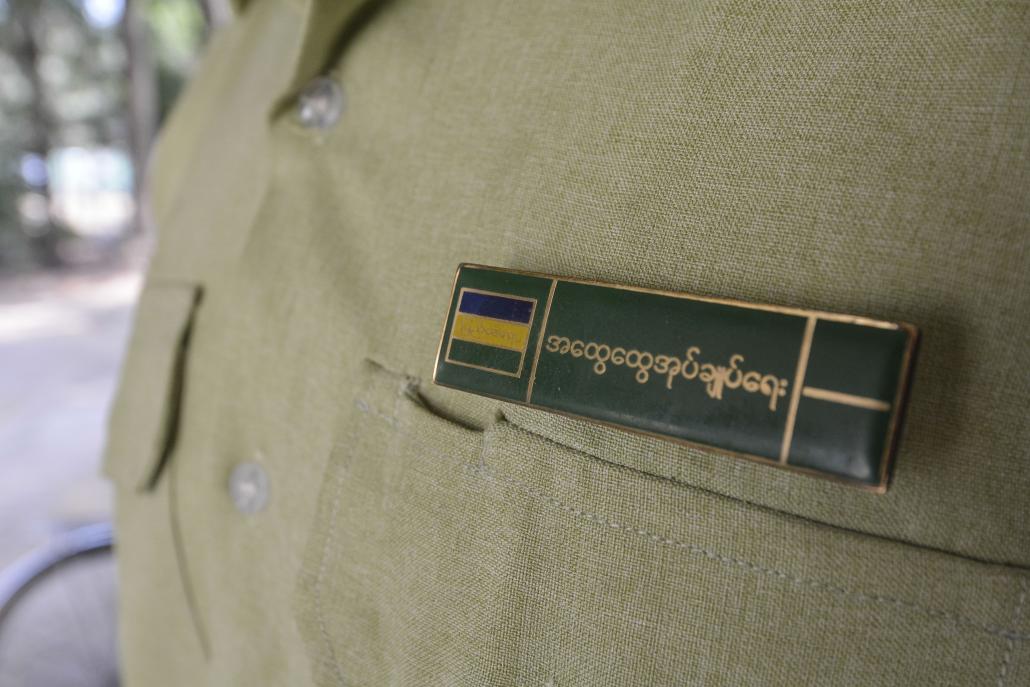
A General Administrator.
"The next government needs to give clear directives from the top to those administrators through their respective administrative organizations. However, some administrators fail to act because they don’t know how. Others are hesitant, worrying whether doing one thing or another might be wrong. If the leadership from above provides precise guidance, I think it will be fine," he said.
According to Myanmar’s Ward or Village Tract Administration Law, when selecting a Ward or Village Tract Administrator, a representative must first be elected from each group of ten households.
From among those elected, a list of individuals who meet the prescribed qualifications is compiled as ten-household representatives. A person’s name is then submitted to be proposed for the position of Ward or Village Tract Administrator.
The ten-household representatives then vote by secret ballot for the names on the list. The person who receives the most votes, if they meet the qualifications, is appointed as the Ward or Village Tract Administrator with the approval of the District Administrator.
Section 9 of the law stipulates that the term of office coincides with the term of the Pyithu Hluttaw (House of Representatives) and shall not exceed three terms.

- By CNI
- Category: English Section
- Hits: 153
CNI News
January 29, 2026
Political analyst U Htet Aung Kyaw told CNI News that if a new civilian government emerging after the election can effectively demonstrate national reforms, it is unlikely that the international community will not support the government.
The Malaysian Foreign Minister, Mohamad Hasan, stated on January 20 that ASEAN had clearly announced in advance that it would not send election observers and would not recognize the election.
On the other hand, Senior General Min Aung Hlaing stated on January 25, 2026—following the conclusion of the third phase of the election—that he does not understand the international community’s recognition or non-recognition, but rather recognizes the public's participation in casting their votes.
U Htet Aung Kyaw told CNI News that the international perspective depends solely on the capabilities of the incoming new government. He noted that an elected government framework is more flexible than the current landscape where the military holds absolute control.

Senior General Min Aung Hlaing seen
He stated: "We are moving from a situation where the military holds 100% control to one where they might hold, say, 25%. Although the military-aligned Union Solidarity and Development Party (USDP) won the majority and everyone views them as the military, I don’t see it quite like that. It becomes an 'elected' body. Regardless of whether voter turnout was low or high, there was no set threshold for how many must vote for it to be valid; therefore, we must define it as an elected government. Such a government holds much more legitimacy than the current state. If this new government can truly show reforms, the countries that previously said they wouldn’t support it will change their attitudes. This is exactly what happened in 2010. Everything will fall into place depending on the new government’s performance and its goodwill toward the country."
Furthermore, U Htet Aung Kyaw added that regarding international relations, the country has already passed through the worst-case scenarios, and there is no reason for things to deteriorate further.
"In my view of international relations, 'it is never darker than at midnight.' We can say we have passed the worst. If an elected government emerges, there will be a better shift. If the resulting government handles matters smartly and can demonstrate real reforms, the 'rays of dawn' will appear. We can hope for that," he said.

Senior General Min Aung Hlaing seen
Dr. Hla Kyaw Zaw, an analyst of China-Myanmar affairs, told CNI News that while the government might gain some level of international legitimacy after its formation, there will be no way out unless internal issues are resolved.
She said: "Once the government is formed, it will gain some degree of international legitimacy as a 'De Facto Government'—a government actually in power. However, it won't be easy to overcome the crises the military is currently facing. While the Malaysian Foreign Minister said they won't recognize the election, a new government will appear regardless. It might receive some recognition internationally, but without solving domestic problems, there is no exit. I think our revolution will have to continue its course. There is no reason for an escape for them. Diplomatically, they might get some breathing room, though."
The multi-party democratic general election in Myanmar was held in three phases, starting from December 28, 2025, and was successfully concluded on January 25, 2026.

- By CNI
- Category: English Section
- Hits: 115
CNI News
January 29, 2026
Military and political observers are analyzing which ethnic figure might step into the role of Vice President (2) in the government expected to form following the 2025 multi-party democratic general election.
Since the administration of U Thein Sein, a tradition has been established where the presidential candidate nominated by the Amyotha Hluttaw (Upper House) is a non-Bamar ethnic person, who then serves as Vice President (2).
Colonel Khun Okkar, Chairman of the Pa-O National Liberation Organization (PNLO-NCA/S), told CNI News that the role might be given to a Rakhine ethnic person this time, with Dr. Aye Maung, Chairman of the Arakan Front Party (AFP), being a top contender.
"Most people estimate that the VP (2) slot is for a Rakhine ethnic person. Currently, Dr. Aye Maung is a popular guess. Even though he was not elected as an MP, a President or VP doesn't necessarily have to be an elected MP. The key is for the Amyotha Hluttaw to nominate them. If we follow tradition, the Shan and Chin have already held this position, so it's likely to rotate."
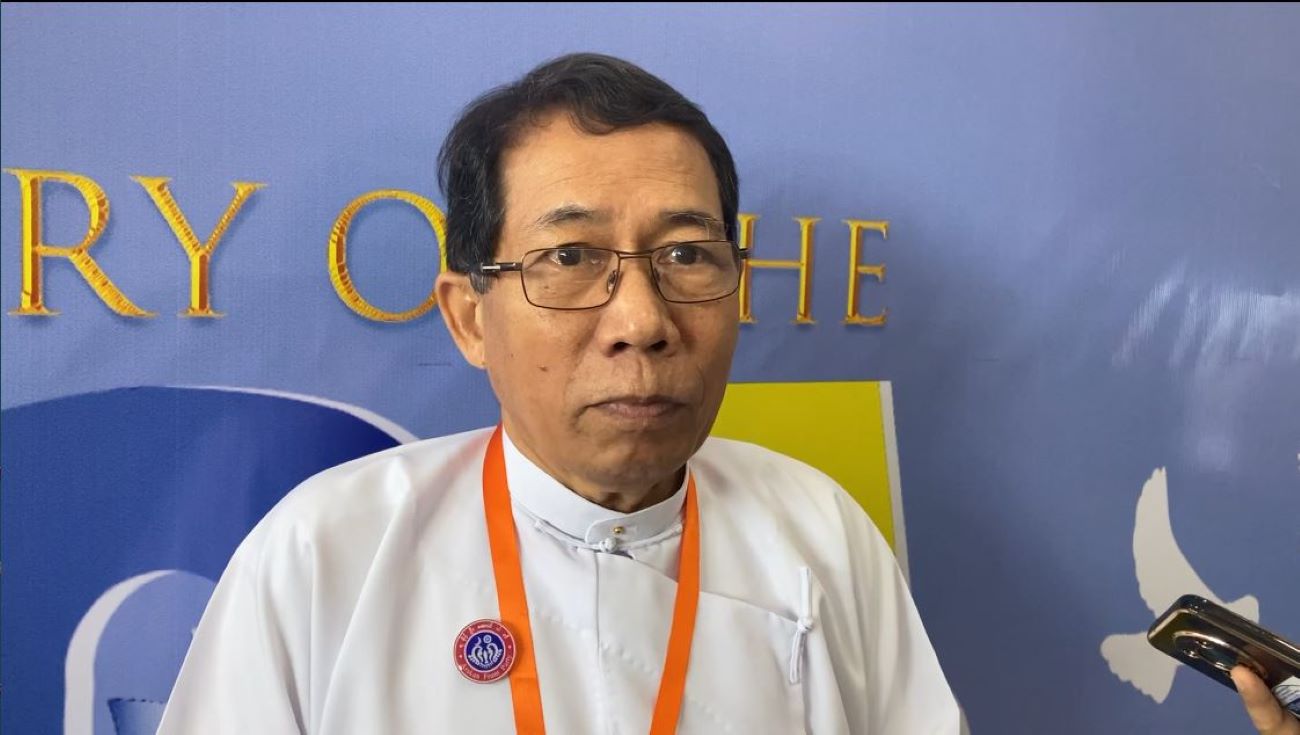
Dr. Aye Maung, Chairman of the Arakan Front Party, seen
Colonel Khun Okkar added that if there is a need to appease Kachin State due to ongoing conflicts, Daw Dwe Bu could be a candidate. She won a seat in the Amyotha Hluttaw representing the USDP in the 2025 election after leaving the Kachin State People's Party (KSPP).
The Selection Process Based on Section 63 of the 2008 Constitution, if a President or Vice President is an elected MP or a civil servant, they must resign from those positions upon being elected.
This confirms that even those who did not win or contest in the recent elections can still be nominated for the presidency.
U Mahn Aung Pyi Soe, Chairman of the Karen National Democratic Party (KNDP), expressed skepticism that appointing an ethnic Vice President would significantly change the dynamics between the military and the ethnic armed groups.
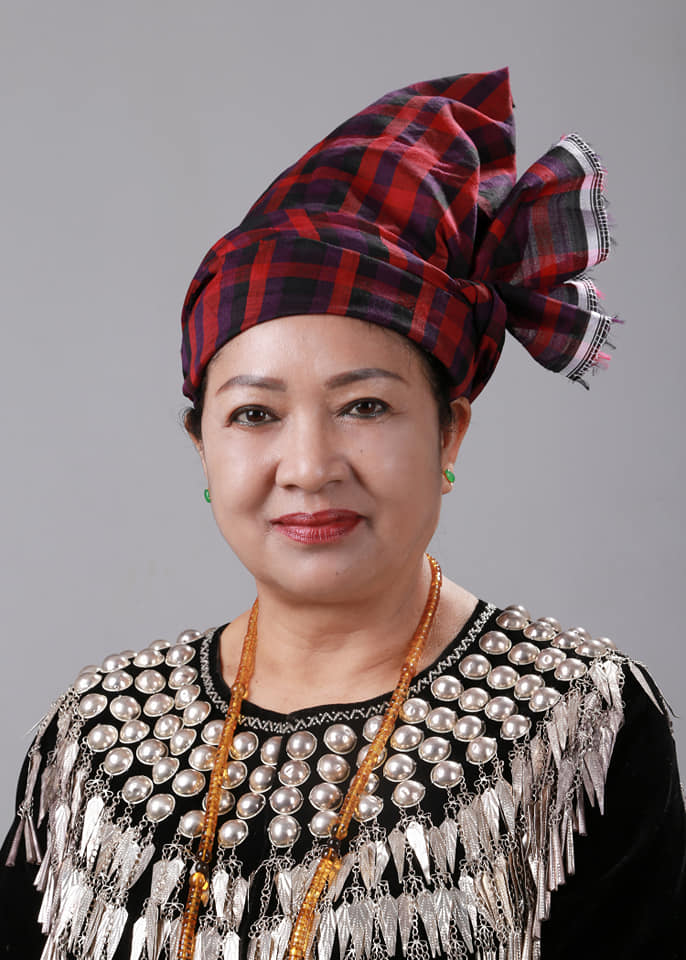
Daw Dwe Bu seen
U Thein Sein Era: Sai Mauk Kham (Shan) NLD Era: Henry Van Thio (Chin) and Mahn Win Khaing Than (Karen - Speaker) Remaining Groups: Mon and Rakhine are among the major ethnicities yet to hold the VP position.
Domestic and international observers speculate that Senior General Min Aung Hlaing may become the President after the election. Analysts further suggest that the incoming government will likely be one dominated and led by the Military (Tatmadaw).

- By CNI
- Category: English Section
- Hits: 120
CNI News
January 29, 2026
Myanmar’s Foreign Minister, U Than Swe, and Pakistani Prime Minister, Mr. Muhammad Shehbaz Sharif, met to discuss increasing cooperation between Myanmar and Pakistan within regional and international frameworks, including ASEAN.
The meeting took place on January 27, 2026, at the Prime Minister’s Office in Pakistan. During the discussion, both parties focused on: Enhancing diplomatic ties and multi-sectoral cooperation.
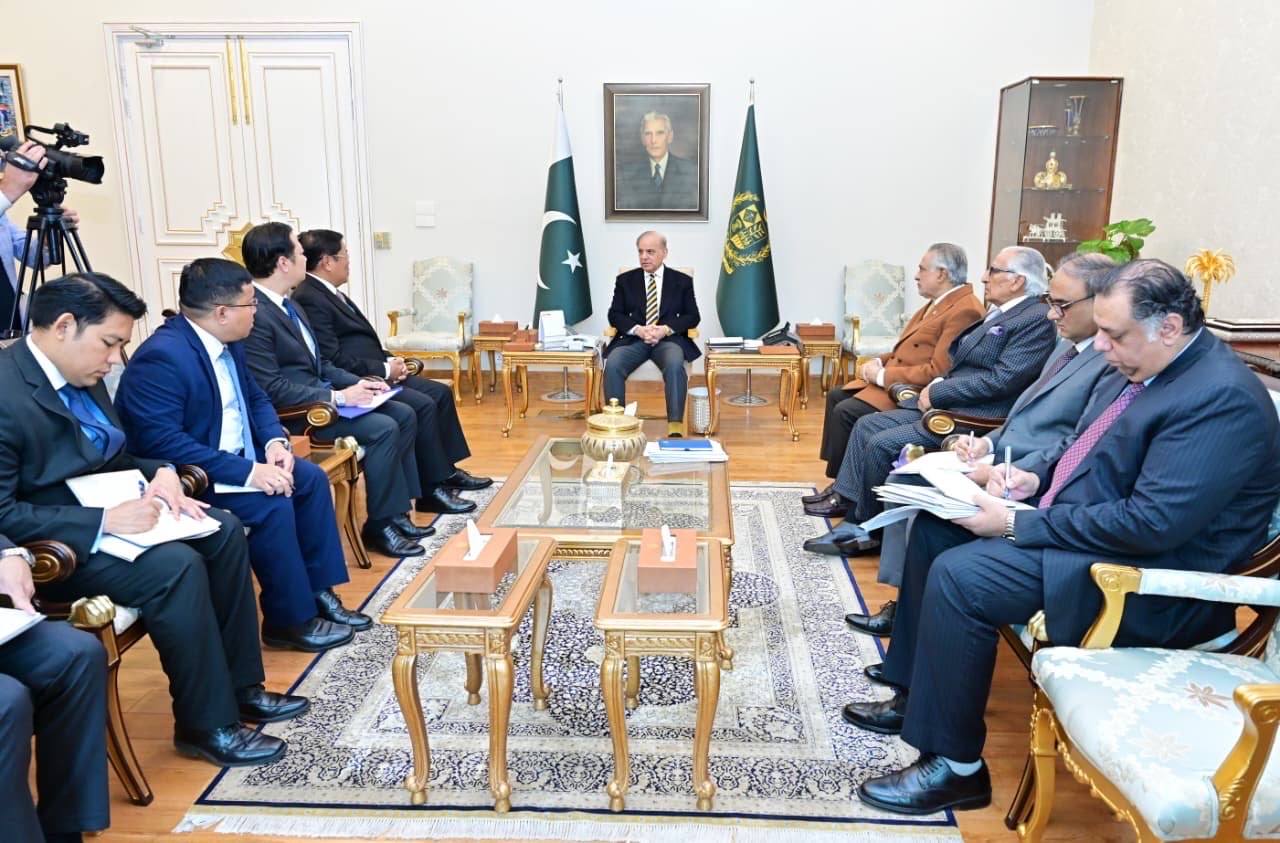
Promoting collaboration in trade, agriculture, livestock, energy, tourism, and culture for mutual benefit.
Increasing coordination and support within regional bodies like ASEAN and on the global stage.
According to a statement from the Myanmar Ministry of Foreign Affairs, Foreign Minister U Than Swe is currently visiting Pakistan at the invitation of the Deputy Prime Minister and Foreign Minister of Pakistan, Mr. Ishaq Dar.



